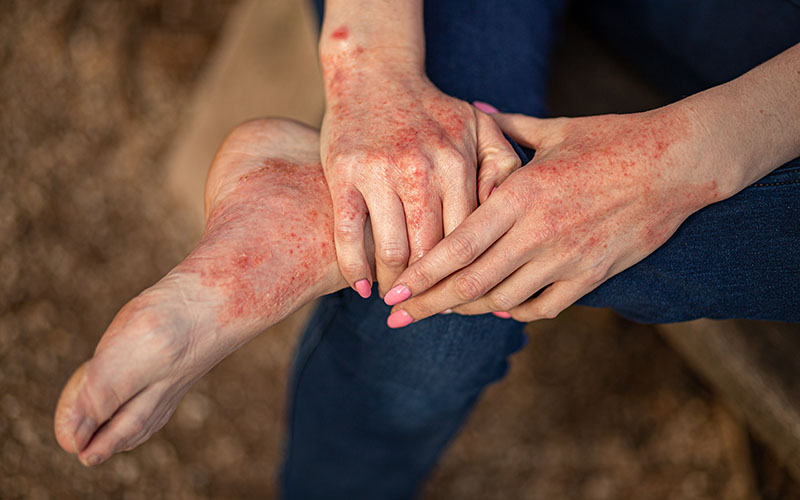
Living with atopic dermatitis (AD), also known as eczema, can be an ongoing battle, with flare-ups causing discomfort and frustration. For Valley patient Polly, her struggle with AD took a drastic turn a few years ago when her symptoms got worse, affecting her daily life and quality of sleep. However, hope arrived while under the care of dermatologist Laura Walsh, MD, PhD, who helped Polly regain control over her condition.

Atopic dermatitis is a chronic inflammatory skin condition that can cause dryness, itching, and a characteristic pattern of rash on the skin. It occurs more frequently in children but can also affect adults (“atopic” means you tend to have allergic conditions and “dermatitis” means skin inflammation). AD is often associated with a personal or family history of other atopic conditions like asthma or hay fever. The exact cause of AD is not fully understood, but it is believed to involve a combination of skin barrier dysfunction (an issue with your skin’s protective layer) and immune regulation (a possible problem with how your body’s defense system works). The condition can vary in severity and may require ongoing care and treatment to control symptoms and prevent flare-ups.
Polly’s condition started as small spots appearing seasonally on her skin. She also became aware that some of her family members also had AD. She used over-the-counter remedies such as moisturizers and antihistamines to manage her flare-ups. However, about three years ago, Polly’s AD suddenly got worse, spreading to different parts of her body. Over time, the relentless itch became unbearable, causing her distress and sleepless nights. It also affected her daily activities, and the itchiness and appearance of her skin left her feeling self-conscious. “Every day shouldn’t be so miserable,” Polly recalled about that time.
Determined to find relief, Polly sought treatment at Valley’s Dermatology Clinic. Dr. Walsh prescribed a newer medication, dupilumab. This medication uses monoclonal antibody therapy, a relatively new field of medicine. It blocks two chemical signals in the body that cause atopic dermatitis, and is safe in patients as young as six months. The medication is given as an injection every two weeks that patients can learn how to do on their own at home.
Within a few weeks of starting the treatment, Polly’s itchiness got significantly better. As the weeks progressed, the number of eczema spots and scaling also decreased. Today, she only has two small spots remaining, a remarkable improvement from her previous state of constant discomfort. “The itching is almost completely gone and I’m sleeping better than I have my whole life,” she said.
“Atopic dermatitis (eczema) can be difficult to treat and frustrating for patients. Itch is a major issue for quality of life that can disturb sleep, make it difficult to concentrate, and be a stressor on a day-to-day basis,” explains Dr. Walsh. “I am so pleased to have these new biologic medications to offer my patients who need to escalate therapy from topical treatments. With recent medical innovation, we now have more targeted medications that have fewer side effects than our prior systemic treatments.”

